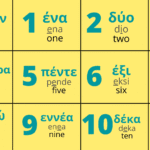We saw in a previous post how to count in Greek but let’s dig a little
deeper now and see how Greeks use numbers as adjectives. So let’s
talk about cardinal andordinal numbers in Greek.
Cardinal Greek Numbers
Since cardinal numbers are considered adjectives in Greek, they need to
agree in gender, number and case with the noun they define. But don’t
fret! Not all numbers are inflected. Actually just a few of them change
their form and the rest remain the same for all genders. But let’s see
some examples first to understand them better and a table of contents
will follow with all Greek cardinal numbers tohave as a guide.
The number 1
We already have seen that 1 is ένα (ena) in Greek. The word ένα is also
used to indicate the neutral noun. So, if we wanted to say for instance
“one table”, we would say ένα τραπέζι (ena trapezi) because the word
is neutral in Greek. Το τραπέζι. But what happens if we want to say “one
sofa” or “one chair”? Then we’re gonna use ένας and μία respectively.
Let’s see this a little bit more analytically.
1 – ένας (enas), μία (mia), ένα (ena)
- ο καναπές – ένας καναπές (enas kanapes) – one sofa
- η καρέκλα – μία καρέκλα (mia karekla) – one chair
- το τραπέζι – ένα τραπέζι (ena trapezi) – one table
Note: For number 11 there’s no inflection, but all other numbers that end in 1 are inflected.
The numbers 3 and 4
As we said before, not all numbers are inflected. Numbers 3 and 4 are
inflected as well, along with all the numbers that end with these digits.
Those two numbers have the same form for masculine and feminine
and change for neutral.
Let’s see some examples:
Number 3
- τρεις καναπέδες (treis kanapedes)
- τρεις καρέκλες (treis karekles)
- τρία τραπέζια (tria trapezia)
- είκοσι τρεις καναπέδες (eikosi treis kanapedes)
- είκοσι τρεις καρέκλες (eikosi treis karekles)
- είκοσι τρία τραπέζια (eikosi tria trapezia)
Number 4
- τέσσερις καναπέδες (teseris kanapedes)
- τέσσερις καρέκλες (teseris karekles)
- τέσσερα τραπέζια (tesera trapezia)
- εκατόν τέσσερις καναπέδες (ekaton teseris kanapedes)
- εκατόν τέσσερις καρέκλες (ekaton teseris karekles)
- εκατόν τέσσερα τραπέζια (ekaton tesera trapezia)
Table of Greek Cardinal Numbers that are inflected
Apart from 1, 3 and 4 and all the numbers that end with these digits, as we
count in Greek we will also come across a few other numbers that are
inflected. I have put all those numbers in a table below, to make your life
easier. For numbers 1, 3, and 4 I have used only some examples because
they always are inflected when a number ends with them. You can read
more about numbers here.
The number 1000 χίλια (hilia) is used until the number 1999.
After that, we always use χιλιάδες (hiliades).
| Greek Numbers | Greek Cardinal Numbers that are inflected |
| 1 | ένας, μία-μια, ένα – enas, mia-mia, ena |
| 3 | τρεις, τρία – treis, tria |
| 4 | τέσσερις, τέσσερα – tesereis, tesera |
| 13 | δεκατρείς, δεκατρία – dekatreis, dekatria |
| 14 | δεκατέσσερις, δεκατέσσερα – dekateseris, dekatesera |
| 21 | είκοσι ένας, είκοσι μία, είκοσι ένα – eikosi enas/mia/ena |
| 23 | είκοσι τρεις, είκοσι τρία – eikosi treis/tria |
| 24 | είκοσι τέσσερις, είκοσι τέσσερα – eikosi teseris/tesera |
| 101 | εκατόν ένας, εκατόν μία, εκατόν ένα – ekaton enas/mia/ena |
| 200 | διακόσιοι, διακόσιες, διακόσια – diakosioi, diakosies, diakosia |
| 300 | τριακόσιοι, τριακόσιες, τριακόσια – triakosioi, triakosies, triakosia |
| 400 | τετρακόσιοι, τετρακόσιες, τετρακόσια – tetrakosioi, tetrakosies, tetrakosia |
| 500 | πεντακόσιοι, πεντακόσιες, πεντακόσια –pendakosioi/-ies/-ia |
| 600 | εξακόσιοι, εξακόσιες, εξακόσια – eksakosioi, eksakosies, eksakosia |
| 700 | εφτακόσιοι, εφτακόσιες, εφτακόσια – eftakosioi, eftakosies, eftakosia |
| 800 | οχτακόσιοι, οχτακόσιες, οχτακόσια – ohtakosioi, ohtakosies, ohtakosia |
| 900 | εννιακόσιοι, εννιακόσιες, εννιακόσια – eniakosioi, eniakosies, eniakosia |
| 1000 | χίλιοι, χίλιες, χίλια – hilioi, hilies, hilia |
| 2000 | δύο χιλιάδες – dio hiliades |
| 10000 | δέκα χιλιάδες – deka hiliades |
| 100000 | εκατό χιλιάδες – ekato hiliades |
Ordinal Greek Numbers
Ordinal numbers show the order of an individual or an item. In Greek,
they are also considered adjectives so they need to
agree in gender, number and case with the noun they define. So,
for each one of them, we have three variations depending on the
gender of the noun. In the table below, you can see all Greek ordinals.
| Greek Ordinal Numbers | |
| 1st | πρώτος, πρώτη, πρώτο – protos, proti, proto |
| 2nd | δεύτερος / -η / -ο – defteros /-i /-o |
| 3d | τρίτος / -η / -ο – tritos /-i /-o |
| 4th | τέταρτος / -η / -ο – tetartos /-i /-o |
| 5th | πέμπτος / -η / -ο – pemtos /-i /-o |
| 6th | έκτος / -η / -ο – ektos /-i /-o |
| 7th | έβδομος / -η / -ο – evdomos /-i /-o |
| 8th | όγδοος / -η / -ο – ogdoos /-i /-o |
| 9th | ένατος / -η / -ο – enatos /-i /-o |
| 10th | δέκατος / -η / -ο – dekatos /-i /-o |
| 11th | ενδέκατος / -η / -ο – endekatos /-i /-o |
| 12th | δωδέκατος / -η / -ο – dodekatos /-i /-o |
| 13th | δέκατος / -η / -ο τρίτος / -η / -ο – dekatos /-i /-o tritos /-i /-o |
| 14th | δέκατος / -η / -ο τέταρτος / -η / -ο – dekatos /-i /-o tetartos /-i /-o |
| 15th | δέκατος / -η / -ο πέμπτος / -η / -ο – dekatos /-i /-o pemtos /-i /-o |
| 16th | δέκατος / -η / -ο έκτος / -η / -ο – dekatos /-i /-o ektos /-i /-o |
| 17th | δέκατος / -η / -ο έβδομος / -η / -ο – dekatos /-i /-o evdomos /-i /-o |
| 18th | δέκατος / -η / -ο όγδοος / -η / -ο – dekatos /-i /-o ogdoos /-i /-o |
| 19th | δέκατος / -η / -ο ένατος / -η / -ο – dekatos /-i /-o enatos /-i /-o |
| 20th | εικοστός / -ή / -ό – eikostos /-i /-o |
| 21st | εικοστός / -ή / -ό πρώτος / -η / -ο – eikostos /-i /-o protos /-i /-o |
| 22nd | εικοστός / -ή / -ό δεύτερος / -η / -ο – eikostos /-i /-o defteros /-i /-o |
| 30th | τριακοστός / -ή / -ό – triakostos /-i /-o |
| 40th | τεσσαρακοστός / -ή / -ό – tesarakostos /-i /-o |
| 50th | πεντηκοστός / -ή / -ό – pendikostos /-i /-o |
| 60th | εξηκοστός / -ή / -ό – eksikostos /-i /-o |
| 70th | εβδομηκοστός / -ή / -ό – evdomikostos /-i /-o |
| 80th | ογδοηκοστός / -ή / -ό – ogdoikostos /-i /-o |
| 90th | ενενηκοστός / -ή / -ό – enenikostos /-i /-o |
| 100th | εκατοστός / -ή / -ό – ekatostos /-i /-o |
| 101st | εκατοστός / -ή / -ό πρώτος / -η / -ο – ekatostos /-i /-o protos /-i /-o |
| 110th | εκατοστός / -ή / -ό δέκατος / -η / -ο – ekatostos /-i /-o dekatos /-i /-o |
| 200th | διακοσιοστός / -ή / -ό – diakosiostos /-i /-o |
| 300th | τριακοσιοστός / -ή / -ό – triakosiostos /-i /-o |
| 400th | τετρακοσιοστός / -ή / -ό – tetrakosiostos /-i /-o |
| 500th | πεντακοσιοστός / -ή / -ό – pendakosiostos /-i /-o |
| 600th | εξακοσιοστός / -ή / -ό – eksakosiostos /-i /-o |
| 700th | εφτακοσιοστός / -ή / -ό – eftakosiostos /-i /-o |
| 800th | οχτακοσιοστός / -ή / -ό – ohtakosiostos /-i /-o |
| 900th | εννιακοσιοστός / -ή / -ό – eniakosiostos /-i /-o |
| 1.000th | χιλιοστός / -ή / -ό – hiliostos /-i /-o |
| 2.000th | δισχιλιοστός / -ή / -ό – thishiliostos /-i /-o |
| 10.000th | δεκακισχιλιοστός / -ή / -ό – dekakishiliostos /-i /-o |
| 100.000th | εκατοντακισχιλιοστός / -ή / -ό – ekatontakishiliostos /-i /-o |
| 1.000.000th | εκατομμυριοστός / -ή / -ό – ekatomiriostos /-i /-o |
| 1.000.000.000th | δισεκατομμυριοστός / -ή / -ό – thisekatomisiostos /-i /-o |
Now let’s see some examples:
Ο Γιώργος ήταν ο πρώτος που τελείωσε την εργασία του
(Ο Υorgos itan o protos pou teleiose tin ergasia tou)
George was the first to finish his homework
Είμαι το τρίτο παιδί στην οικογένεια
(Eimai to trito paidi stin oikogeneia)
I’m the third child in the family
Σου είπα για εκατομμυριοστή φορά, ότι αυτό που κάνεις δε μου αρέσει
( Sou eipa gia ekatomiriosti fora oti afto pou kaneis de mou aresei)
I told you for the millionth time, that I don’t like what you are doing
Το όνομά μου είναι τριακοστό πέμπτο στον κατάλογο
(To onoma mou einai triakosto pempto ston katalogo)
My name is thirty-fifth on the list
Είναι τα εκατοστά δεύτερα γενέθλιά της
(Einai ta ekatosta deftera yenethlia tis)
It is her one hundred and second birthday
Well, that was it for today! Don’t hesitate to leave a comment if you have
any questions. See you at the next lesson 🙂


